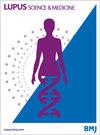伴有或不伴有神经精神症状的系统性红斑狼疮患者的拓扑结构特征
IF 3.7
2区 医学
Q1 RHEUMATOLOGY
引用次数: 0
摘要
目的 本研究调查了伴有和不伴有神经精神症状(NPSLE 和非 NPSLE)的系统性红斑狼疮(SLE)的拓扑结构特征,并探讨其临床意义。方法 我们采用磁共振成像弥散张量成像技术,前瞻性地招募了 50 名系统性红斑狼疮患者(21 名非系统性红斑狼疮患者和 29 名系统性红斑狼疮患者)和 32 名年龄匹配的健康对照组(HCs)。利用脑区之间的纤维数量作为边缘权重,构建个体结构网络。计算了全局指标(如小世界度、全局效率)和局部网络特性(如度中心性、节点效率)。对网络特征进行分组比较。使用偏相关性评估临床相关性,并使用支持向量分类法区分非 NPSLE 和 NPSLE。结果 与HCs相比,非NPSLE和NPSLE患者均表现出明显的整体和局部拓扑学改变。这些变化在非系统性红斑狼疮中更为明显,尤其影响到默认模式和感觉运动网络。系统性红斑狼疮患者的拓扑变化与病变负担和临床参数(如病程和系统性红斑狼疮国际合作诊所损害指数)相关。已识别的拓扑特征可准确区分非系统性红斑狼疮和系统性红斑狼疮,准确率达 87%。结论 系统性红斑狼疮患者的结构网络可能在整体和局部水平上都发生了改变,在非系统性红斑狼疮中观察到的变化更为明显,尤其是影响了默认模式和感觉运动网络。这些改变有望成为临床诊断的生物标志物。如有合理要求,可提供相关数据。本文章由计算机程序翻译,如有差异,请以英文原文为准。
Topological structural characteristics in patients with systemic lupus erythematosus with and without neuropsychiatric symptoms
Purpose This study investigated the topological structural characteristics of systemic lupus erythematosus (SLE) with and without neuropsychiatric symptoms (NPSLE and non-NPSLE), and explore their clinical implications. Methods We prospectively recruited 50 patients with SLE (21 non-NPSLE and 29 NPSLE) and 32 age-matched healthy controls (HCs), using MRI diffusion tensor imaging. Individual structural networks were constructed using fibre numbers between brain areas as edge weights. Global metrics (eg, small-worldness, global efficiency) and local network properties (eg, degree centrality, nodal efficiency) were computed. Group comparisons of network characteristics were conducted. Clinical correlations were assessed using partial correlation, and differentiation between non-NPSLE and NPSLE was performed using support vector classification. Results Patients with oth non-NPSLE and NPSLE exhibited significant global and local topological alterations compared with HCs. These changes were more pronounced in NPSLE, particularly affecting the default mode and sensorimotor networks. Topological changes in patients with SLE correlated with lesion burdens and clinical parameters such as disease duration and the systemic lupus international collaborating clinics damage index. The identified topological features enabled accurate differentiation between non-NPSLE and NPSLE with 87% accuracy. Conclusion Structural networks in patients SLE may be altered at both global and local levels, with more pronounced changes observed in NPSLE, notably affecting the default mode and sensorimotor networks. These alterations show promise as biomarkers for clinical diagnosis. Data are available upon reasonable request.
求助全文
通过发布文献求助,成功后即可免费获取论文全文。
去求助
来源期刊

Lupus Science & Medicine
RHEUMATOLOGY-
CiteScore
5.30
自引率
7.70%
发文量
88
审稿时长
15 weeks
期刊介绍:
Lupus Science & Medicine is a global, peer reviewed, open access online journal that provides a central point for publication of basic, clinical, translational, and epidemiological studies of all aspects of lupus and related diseases. It is the first lupus-specific open access journal in the world and was developed in response to the need for a barrier-free forum for publication of groundbreaking studies in lupus. The journal publishes research on lupus from fields including, but not limited to: rheumatology, dermatology, nephrology, immunology, pediatrics, cardiology, hepatology, pulmonology, obstetrics and gynecology, and psychiatry.
 求助内容:
求助内容: 应助结果提醒方式:
应助结果提醒方式:


